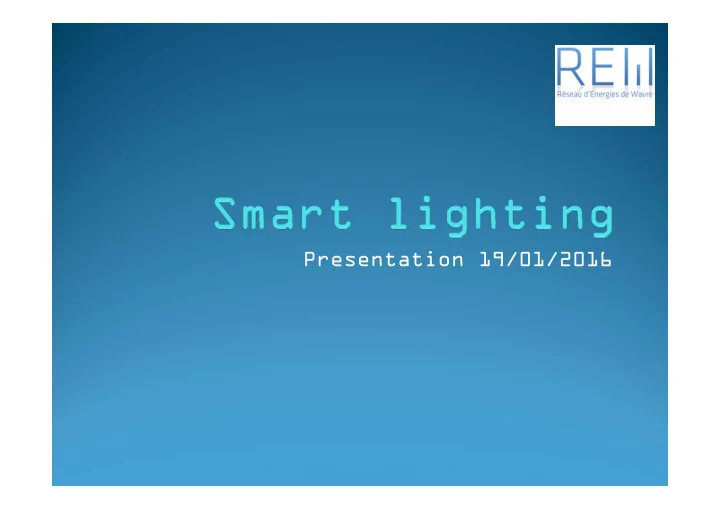

Presentation 19/01/2016
Smart lighting Introduction I. Concept II. III. Investissement IV. Partners First Results V. VI. Experiences Consortium VII. Interaction with public authorities VIII. Specific Business IX. Lessons learned
Smart lighting INTRODUCTION I. Goals : More energy save • More efficacy • Environment respect • New Technology • Introduction to smart city concept • Wellness, security, mobility, citizenship participation • aesthetic • Constraints : European Directives • Art 135 §2 communal law • Lighting standards(EN 13.201) • RW Technical requirements : CCT310V2000 • Technical requirements of the sector : Synergrid • Respect of Public service obligation : CWaPE • CWaTUPE •
Smart lighting II. Concept Lighting requirements Traffic flow Traffic speed Crossing type and density Dynamic lighting network Distributed intelligence Sensors on the field Interpretation between neighboring luminairies Local decision A bubble of light is generated by communicating agents, in a decentralized fashion.
Smart lighting II. Concept Smart lighting is a real time intellingent management model for street lighting
Smart lighting III. Investissement ‐ Site Description Contracting authority : Régie de Wavre • Residential area of about 400 houses • 282 standalone modules • Price : 615.000 € Public lighting include 227.000 € dynamic • management Video on www.smartnodes.be/installations •
Smart lighting
Smart lighting IV. Partners • Contracting authority : Régie de Wavre • Firme : Cofely Fabricom – GDF SUEZ • Intégrator : CDEL • Providers: • iGuzzini • Smartnodes
Smart lighting V. First Results Energy saving : 73 % compared to old street light 55 % compared to traditional management way Power saving : 60 to 80 %
Smart lighting VI. Experience Consortium • REW actively participated in the development of management modules • Electric connection • Fixation • Design
Smart lighting VII. Interaction with Public Authorities Consistency actions of public authority of Ville de Wavre • General policy • Control of expenditure • Strategic development • Wellness of the citizen • Security and Mobility • Information et participation of the citizen in public life • Introduction of smart city concept • Territory Development • Durability •
Smart lighting VIII. Specific Business – Futurs Additional sensors ; weather, air pollution, noise level • Monitoring and control • Variable message road signs • Ghost driver detection • Danger signaling • Traffic jam • Mobility analysis • Waste management • Detect full bins • Predict bin usage • Send collecting truck only when and where needed •
Smart lighting IX. Lessons learned
Smart lighting
Recommend
More recommend